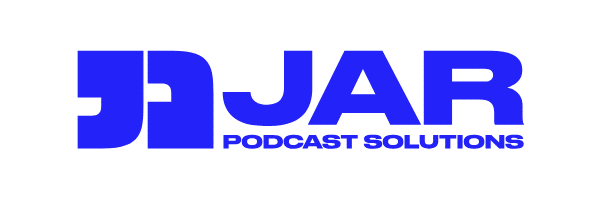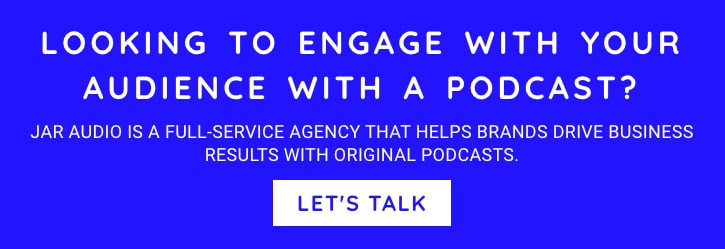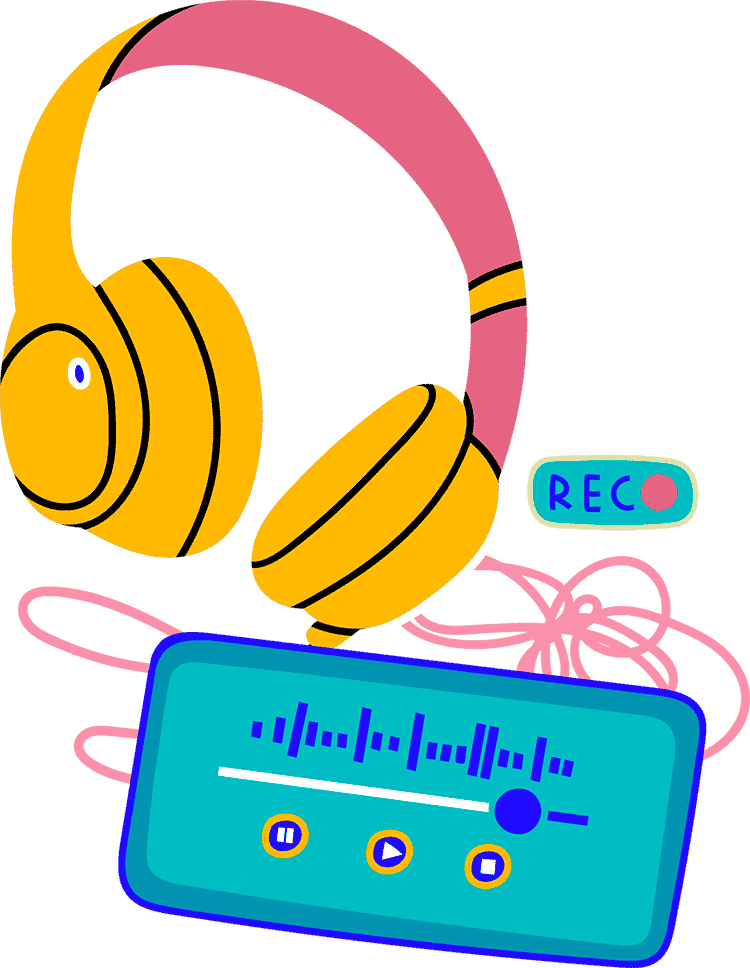Explore the Best Podcast Formats for Business and How They Can Solve Your Marketing Challenges
Exploring the right podcast formats for business can help give your branded podcast a unique platform for your brand to connect with your audience through audio storytelling. However, with a range of formats available, it can be challenging to determine which one is best suited for your brand’s specific marketing challenge. Let’s explore the pros and cons of three popular podcast formats: interview, narrative, and interview/narrative hybrid. By understanding the advantages and challenges of each format, you as a marketer can make an informed decision about which approach to take to solve your brand challenge.
Interview Format
If, when you picture a podcast, you imagine an engaging back-and-forth, witty banter, and a fantastic, educational conversation that enraptures an audience and lays your brand’s claim as an authority in its realm, then the interview format might be what you want to explore. Here’s the skinny on interviews…
Pros:
- Relatively easy to produce: Interview podcasts require less scripting, editing, and post-production work compared to other formats.
- Establishes thought leadership: By featuring industry experts and influencers, marketers can position their brand as a credible source of information.
- Human connection: The conversational nature of interviews creates an engaging listening experience, fostering a connection between the audience and the interviewee.
- Diverse perspectives: Each guest brings their own unique experiences, insights, and opinions, keeping the content fresh and interesting.
Cons:
- Dependent on guests: The success of an interview podcast largely depends on the quality and availability of guests, which can be challenging to maintain.
- Less control over content: Marketers have limited control over the direction of the conversation, which may not always align with their messaging goals.
- Potential for redundancy: If not carefully managed, interviews can become repetitive, with similar questions and topics being covered in multiple episodes.
If you’re curious about what that could look like for your brand, take a peek at This Is Small Business, a podcast by Amazon:
What it’s about:
Andrea Marquez, host of This Is Small Business, is a curious millennial and possibly a future small business owner. In this podcast, she investigates what makes a successful small business boom by talking to industry experts and small business owners from all over about how to start, build, and grow a business. This podcast is packed with information, and each episode is bookended with tangible, actionable takeaways, so make sure you have your small business playbook nearby and get ready for the journey!
Narrative Format
The beauty behind podcasting as a marketing tool is that it is exceptionally creative, which gives you plenty of power to shape an impactful story reflecting your brand, vision, and expertise. The narrative format, in particular, offers a lot of room for capturing your audience.
Pros:
- Highly engaging: Narrative podcasts use storytelling techniques to immerse listeners in the content, keeping their attention and interest.
- Strong brand messaging: Marketers have full control over the content, allowing them to effectively communicate their message and values.
- Emotional resonance: The power of storytelling can create an emotional connection with the audience, enhancing brand affinity.
- High production value: A well-produced narrative podcast can leave a strong impression, elevating the brand’s image.
Cons:
- Resource-intensive: Narrative podcasts require significant time, planning, scripting, editing, and post-production, making them more expensive and time-consuming to produce.
- Limited expert insights: Since this format isn’t limited to interviews with experts, it can lack the diverse perspectives and credibility provided by industry experts.
- Reliance on compelling stories: The success of a narrative podcast depends on the quality of the stories being told, which can be challenging to consistently source or create.
For an excellent narrative podcast, here is Nice Genes!, by Genome BC:
What it’s about:
Nice Genes! Is hosted by science educator and rat-lover Dr. Kaylee Byers, who looks into incredible science, bold missions and brainy ideas that give us hope for this spinning rock we all call home. By using tools like genomics and confronting big ethical questions, we begin to see the glimmer of a brighter tomorrow. Nice Genes! is brought to you by Genome BC.
Interview/Narrative Hybrid Format
If your brand isn’t as cut and dry as a conversation that makes you a powerhouse, then adding a narrative flair can go a long way. The Interview/Narrative Hybrid takes the best elements of both formats to build an excellent and engaging podcast. Check out this format as a potential problem-solver for your brand.
Pros:
- Balanced content: Combines the benefits of interviews (human connection, expert insights) with narrative storytelling elements (engagement, storytelling).
- Greater control over content: Marketers can more effectively shape the message and story to align with their goals.
- Unique and engaging: The combination of formats keeps the podcast interesting and helps it stand out from the competition.
- Stronger emotional impact: Incorporating narrative elements can evoke emotions in the audience, creating a memorable listening experience.
Cons:
- More complex production: This format requires additional planning, scripting, editing, and post-production, resulting in higher time and resource investments.
- Potential inconsistency: Balancing interviews with narrative storytelling can sometimes create an inconsistent tone or pace, potentially confusing or disengaging listeners.
Infernal Communication by Staffbase showcases that perfect blend between narrative and interview. Find it here:
What it’s about:
Communication is hard. Being a communications professional is even harder. Each episode of Infernal Communication takes a deeper look at the wild little fires communicators have to put out every day. Join Kyla from Staffbase as she recruits authors, scientists, and experts to help get some fresh perspectives that will soothe the burn of your latest communication snafu, and help you think differently about your work and life.
The power of these podcast formats, as opposed to audio drama, non-linear, and solo formats, is that, with excellent writing and production, you’ll be able to connect with your audience in a unique and intimate way that actually works for marketing. Depending on the particular brand and marketing challenge you currently face, a podcast can be the right solution — you, as a marketer, just need to choose the format that best lets your brand shine.
If you have decided that a branded podcast is the right marketing move, you have one more decision to make: Do you hire a production studio or a podcast agency? Head on over to this blog post to find out.
5 Key Takeaways on Podcast Formats for Business
- Interview Format: This format is relatively easy to produce and can establish your brand as a thought leader by featuring industry experts. However, it relies heavily on guest availability and quality.
- Narrative Format: Highly engaging and allows for strong brand messaging through storytelling. It requires significant resources and compelling stories to succeed.
- Hybrid Format: Combines the strengths of both interviews and narrative elements, offering balanced and engaging content. This format is complex to produce and may risk inconsistency.
- Choosing the Right Format: Selecting the appropriate podcast format depends on your brand’s unique marketing challenges and goals, ensuring the content resonates with your target audience.
- Production Considerations: Each format comes with its own set of production requirements and challenges, from scripting and editing to guest coordination and storytelling.
By Roger Nairn, CEO
Roger transitioned from a 22 year career in advertising account management to co-founding JAR, a podcast podcast production agency. As CEO of JAR, he propels the company’s growth by prioritizing audience engagement and podcast marketing. Under his guidance, JAR flourishes with a global clientele, aiming to broaden its reach across North America and revolutionize brand connections through immersive storytelling.




